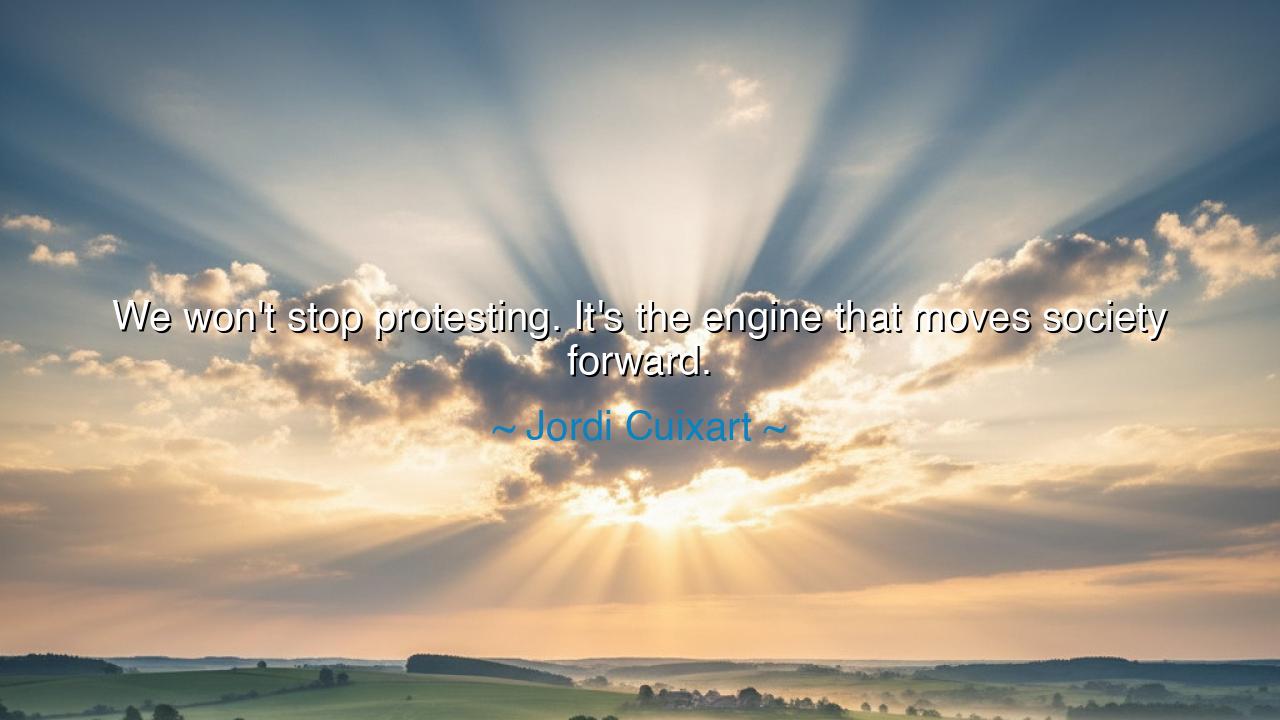
We won't stop protesting. It's the engine that moves society






Hear the fiery words of Jordi Cuixart: “We won’t stop protesting. It’s the engine that moves society forward.” These are not mere utterances, but a declaration forged in the fire of struggle. They remind us that protest is not chaos, nor the restless noise of the discontented, but the very heartbeat of change. Without it, society lies stagnant; with it, injustice is challenged, and the future is born anew. Protest is the cry of the oppressed, the awakening of the slumbering, and the roar that shakes tyrants upon their thrones.
The ancients themselves bore witness to this truth. When the Hebrew slaves groaned under the weight of Pharaoh’s chains, their cries became the thunder that split the Red Sea and brought forth freedom. When the plebeians of Rome withdrew from the city and refused to fight until their rights were recognized, the protest forced the patricians to create new offices and grant the people greater power. Thus, across ages, the march of progress has always been driven not by silence, but by the voices of those who refused to accept the yoke of oppression.
Consider the story of Mahatma Gandhi, who stood against the vast machinery of the British Empire armed not with swords, but with truth and the will of the people. Through marches, fasts, and civil disobedience, he turned protest into a sacred weapon. The Salt March, a simple act of defiance, ignited millions and revealed that protesting was not the act of rebels seeking destruction, but of visionaries demanding justice. The empire trembled, not before violence, but before the collective power of voices raised together.
So too in America, the Civil Rights Movement became the engine that propelled society toward equality. Rosa Parks, Martin Luther King Jr., and countless unnamed heroes stood in protest against laws that chained human dignity. Their marches, their sit-ins, their songs of freedom cracked the walls of segregation. It was not comfort, nor complacency, that carried justice forward—it was protest, the relentless insistence that truth must rise above falsehood, and freedom above bondage.
Cuixart’s words also remind us of the deeper danger: when protest is silenced, society begins to decay. For when people are forbidden to speak, their suffering festers in the dark. The suppression of protest may bring the illusion of peace, but it is the peace of the graveyard, where voices are buried, and injustice rules unchallenged. Protest, though uncomfortable, is the sign of a living, breathing society. It is the fire that cauterizes wounds and purges corruption.
The lesson is clear: never despise protest, for it is the mark of those who care enough to demand better. To protest is to love deeply—to love justice, to love truth, to love the generations yet unborn who will inherit the world we shape. It is not the destroyer of society, but the builder of its future. Protest is the chisel in the hands of the people, carving liberty from the stone of tyranny.
Therefore, O listener, take this wisdom to heart: do not be among those who sit idle while injustice reigns. If you see wrong, raise your voice. If you see oppression, stand beside the oppressed. March, speak, write, sing—whatever form your protest may take, let it be steady, courageous, and unyielding. For as Cuixart declares, “We won’t stop protesting. It’s the engine that moves society forward.” To protest is to keep the wheel of justice turning, to move the world from darkness toward the dawn.
And so, let these words echo in your spirit: protest is not the end, but the beginning; not the breakdown of society, but its rebirth. Guard it, honor it, and when the time comes, join it—for through protest, the powerless become powerful, and the dream of justice becomes the living reality of tomorrow.






AAdministratorAdministrator
Welcome, honored guests. Please leave a comment, we will respond soon